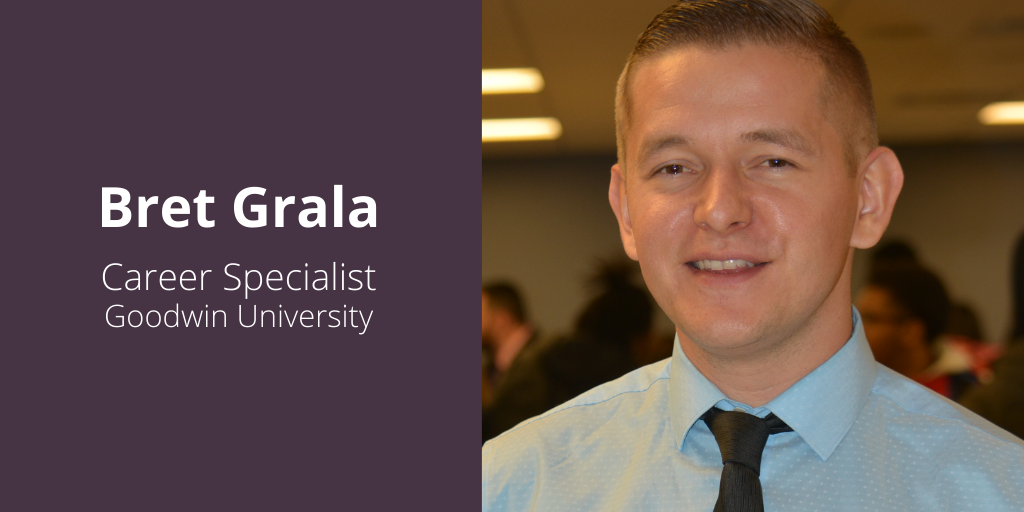Navigating discussions with students about career development in the midst of a pandemic can oftentimes feel like a maze with no end.
Career and academic advisors have certainly felt the effects of the pandemic — whether you’re working with recent graduates who are struggling to find employment, alumni who have been laid off, or new students who are rethinking the vitality of their career paths
So, I consulted Bret Grala, a career specialist and self-proclaimed “career-driven student affairs professional” at Goodwin University, about how he has been helping his students make the most of their experiences to find a fulfilling career after COVID-19.
I learned how Bret and his team have been moving career support online, resources for career services that have been vital, and how his team is tackling the behemoth challenge of moving the fall career fair online. Perhaps you’ll find his stories applicable (or even inspiring!) for your own work.

Q: Tell me about yourself and your philosophies as a career advisor.
A: As a career specialist I approach every advising session with empathy. I am a large fan of Carl Rogers and the Client-Centered counseling approach. This has come into play especially when working with students who have felt the effects of COVID-19 on their careers.
Q: Tell me about the students you work with. What are their top concerns right now?
A: At Goodwin University I serve a highly diverse student population — in programs ranging from manufacturing to business administration to the health sciences. Many of them come to me asking, “How do I get a job in my field of study with minimal experience?”
I also work with a non-traditionally-aged population; the average age of our students is 28 years old, and many are coming back for a midlife career change. My goal is to help them showcase their individual transferable skills.
Q: As someone who started in student affairs right after the 2009 recession, how has that influenced your outlook as an advisor?
A: The recession showed me that choosing a major that has concrete career outcomes is highly connected with finding a career that is sustainable through a major economic depression.
Although I fully support the arts and liberal studies majors, my personal experiences have brought me to follow a philosophy which focuses on marketing yourself with your degree. At my current institution, we have very high rates of major and career outcome match. Meaning, career outcomes are heavily shaped by their major (for example, a nursing major becoming a nurse after graduation).
I believe a large value of higher education is assisting students for career readiness and finding meaningful employment after leaving the institution. I even wrote my thesis on this exact topic.
Q: How has COVID-19 influenced your outlook?
A: Career advising through the pandemic has been really challenging. There were hiring freezes in industries that affected many of the students I work with. On the other hand, healthcare and manufacturing jobs were very resilient and even grew within some areas.
Although there may have been some delays in the hiring process, causing feelings of frustration, there has been a recent increase in positions posted for nurses, medical assistants, and in manufacturing.
Q: What kinds of concerns have you heard from students in relation to finding a career after the pandemic?
A: I’ve heard a lot from students about not hearing back from employers, AKA “getting ghosted”.
Sometimes the students ghost the employers. Some are questioning if it’s worth it to come off of unemployment with the stimulus package, COVID-relief funds, and have concerns about their own health and spreading the virus to their family members should they come in contact with the virus.
Q: Tell me more about a specific concern you heard from a student related to COVID-19.
A: One student I worked with received a job offer from a company she really wanted to work for, but her spouse has a preexisting respiratory ailment leaving him susceptible to COVID-19. I explained to her that it may be wise to hold off on accepting the position and return back to work when she feels it’s safe to resume her job search. Communication with the potential employer was key here.
Q: What advice would you give other career advisors working in the midst of the pandemic?
A: My department subscribes to the NACE web blogs, which helps us keep up with other career service specialists who are adapting to the pandemic.
I also try to pay particular attention to the data, labor trends on resilient and non-resilient industries specifically. I have also focused on expanding my professional development through webinars, not only on COVID-19 but issues of equality and social justice that are affecting students of color. There is a lot going on in the world which affects everyone at an institution and the learning process. Staying up-to-date is key to my practice.
Q: How has COVID-19 affected the way in which your department operates? What were some of your top changes and solutions?
A: My department has had to convert the career fair, virtual workshops, and meetings with staff or students to online.
Initially, it was a challenge to get familiarized with different technologies and to figure out which virtual resources best served our department. Some of these workshops we were working on, such as networking opportunities, traditionally promoted the opposite idea of social distancing.
However, we have found that virtual options are more convenient for individuals who were already online students or couldn’t be on campus when the workshop would have been offered. So far, we have been able to move the following workshops online: Career Options, Resume Cafe, Get Ready Get Set Interview, Fall Career Fair, and Virtual Support Groups.
Q: How is the online career fair going to work?
A: We are looking into a number of virtual platforms, weighing the pros and cons. We are particularly looking at each platform’s time limits, budget, and ability to handle many breakout rooms. We are hoping to utilize breakout rooms for students to privately connect with employers and have a ‘wait in line’ feature to not have too many students in one virtual room.
Q: What lessons have you learned from this experience?
A: When you are in a virtual meeting, be mindful of your background, your pets, family members, and potentially FERPA-protected content on your screen before sharing with students/staff meetings, including email notifications that may pop up.
Take mindfulness breaks between sessions for your eyes and your mental health.
Special thank you and shout out to Bret Grala for letting me interview him for this piece! Bret is truly an inspiration in his passion for working students through tough career choices and has been a supportive colleague since my first day at Goodwin University.
We know that discussing future careers during a global pandemic isn’t ideal.
But with empathy, resourcefulness, and communication, you can build constructive career advising experiences that are supportive of student career development.
For more ways on addressing students’ current and future careers in a positive and growth-minded manner, check out 3 Ways to Empower Students in Their Career Paths Despite the Uncertain Future.
What additional advice do you have about discussing career development with students during the pandemic? Connect with us on Twitter @themoderncampus.






